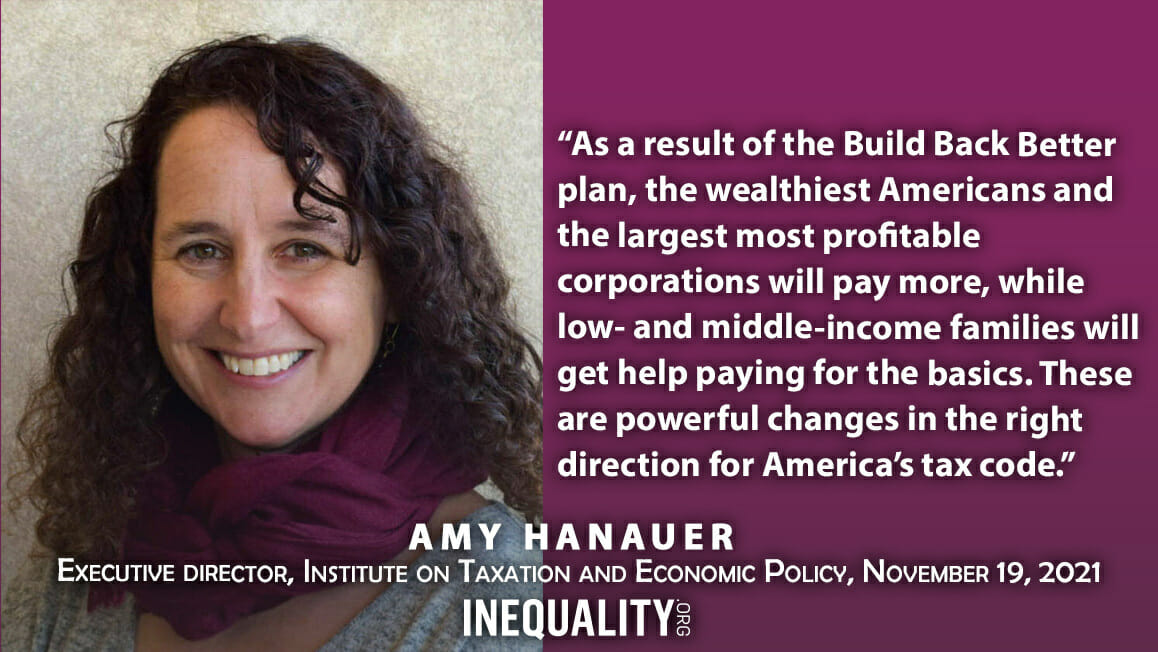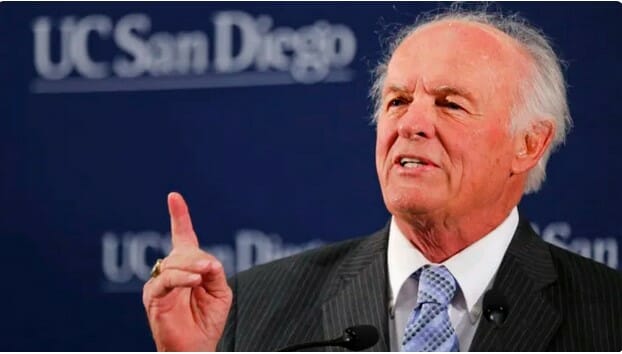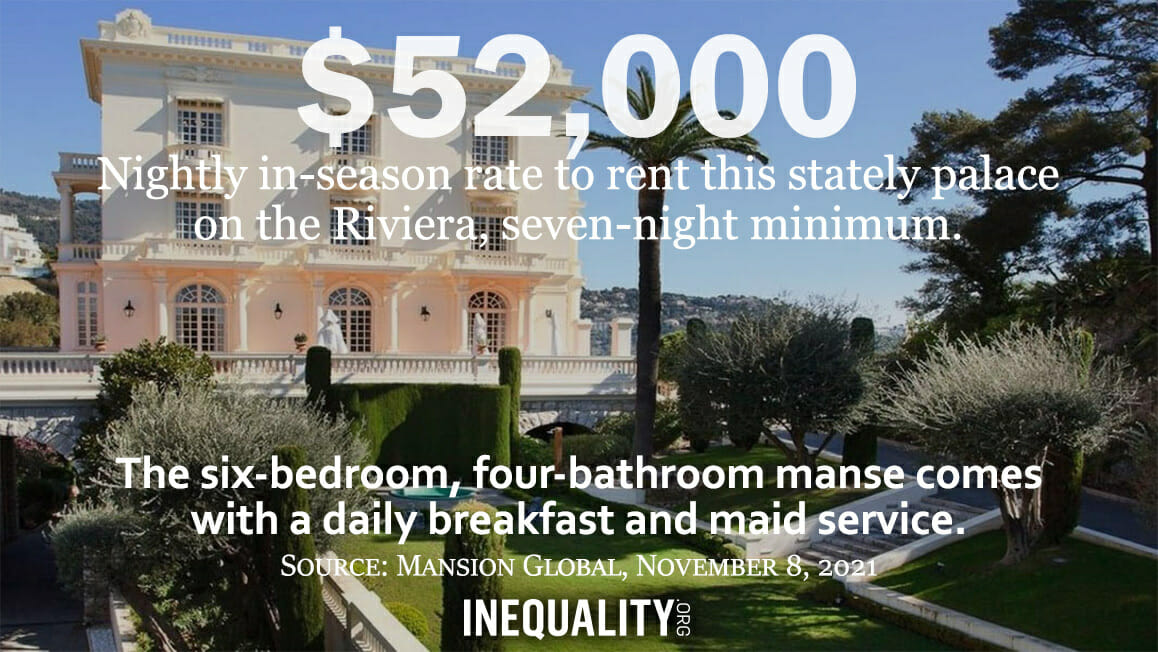| THIS WEEK |
Turn on any cable news show and you’re likely to hear pundits and pols express concerns over the rising rate of inflation. One now-deleted viral tweet from MarketWatch even suggested that $5 gallons of gas, $90 bottles of wine, and $200 concert tickets are becoming the norm.
This sort of inflation hysteria is doing no one any good — except our corporate execs. Yes, some costs have indeed risen as the economy reopens and demand surges, creating all sorts of supply bottlenecks. Big corporations are now exploiting this moment. They’re squeezing consumers, raising prices to ensure fatter profit margins. “A lot of large firms,” one analysis in the business press noted last week, ”have spent their recent quarterly calls bragging to investors about their ability to hike prices with relative impunity.”
This corporate greed is shrinking budgets for both American families and small businesses. But some serious relief from that greed may be coming soon from the Build Back Better Act, if the U.S. Senate follows the House lead and backs this legislation’s historic investments in American workers and progressive tax provisions. More on all of that in this week’s issue.
Chuck Collins and Rebekah Entralgo,
for the Institute for Policy Studies Inequality.org team
|
|
| |
|
| INEQUALITY BY THE NUMBERS |
 |
|
|
|
| |
|
| FACES ON THE FRONTLINES |
 |
| Pramila Jayapal: A Progressive in the Hot Seat |
Congressional Progressive Caucus Chair Pramila Jayapal has been a champion of many bold inequality-fighting proposals that don’t appear in the Build Back Better Act the House of Representatives passed last week, measures that range from a wealth tax to Medicare for All.
But this Seattle lawmaker recognizes the opportunity, in the current budget battle, to secure a “down payment” on her much bolder agenda. And she’s been willing to take the heat to make that happen. Twice she’s stood up to her party’s leaders to block votes on a narrow bipartisan infrastructure bill, insisting the House approve that bill in tandem with Build Back Better.
Then Jayapal upset some on the left by leading most members of her Caucus to vote for the bipartisan bill as a stand-alone, after centrist Democrats had given her a verbal commitment to support Build Back Better at a later date. Could those centrists, many wondered, be trusted?
Last Friday, Jayapal’s gambit paid off when House Democrats almost unanimously passed the legislation. With Senate approval still in question, no one is yet declaring victory. But, as Inequality.org co-editor Sarah Anderson explains, having Jayapal in the center of this high-stakes game increases the odds of winning real progress for people and the planet. |
|
| |
|
| WORDS OF WISDOM |
 |
|
|
|
| |
|
PETULANT PLUTOCRAT
OF THE WEEK |
 |
| A Billionaire’s Long, Hard Road to Dying Broke |
| South Dakota billionaire T. Denny Sanford has had better weeks. Last Monday, the Sioux Falls Business Journal revealed that the CEO at the biggest recipient of Sanford’s philanthropy, Sanford Health, had pocketed $49 million in 2020. That CEO “retired” last year after the uproar that followed his refusal to wear a mask to work. This past Wednesday, a release of court documents confirmed that Sanford has been the “implicated individual” in a child porn probe that began two years ago. The 85-year-old has had no comment on the latest revelations, but his lawyer, South Dakota’s former attorney general, is emphasizing the “ultimate fact” that “authorities have not found information to support criminal charges.” Sanford first hit the national headlines in 2007 when he announced plans to give away all his money and “die broke.” His net worth at the time: about $2.8 billion. His current net worth: $3.4 billion. |
|
| |
|
| BOLD SOLUTIONS |
 |
| We Can Fight Inflation Fears With Good Jobs |
| The annual U.S. inflation rate surged to 6.2 percent last month, the highest rate since November 1990. Some politicians are predictably claiming that any new government spending to help American families will speed even more inflation. But their claims misread our current inflation realities. Slowing down our economy to boost corporate profits won’t eliminate the need for families to purchase the products they depend on or fix our supply-chain problems. Domenica Ghanem of the Center for Community Change has more on why one of the best long-term investments we can make to fighting inflation would be passing the Build Back Better Act. |
|
| |
|
| GREED AT A GLANCE |
 |
|
|
|
| |
|
| TOO MUCH |
 |
| America’s New Art ‘Appreciation,’ Billionaire-Style |
| Vermeer. Velázquez. Kahlo. These names mean anything to you? They mean plenty to the world’s super rich. For the extraordinarily wealthy, the artworks of Vermeer, Velázquez, and Kahlo — and the many other great painters who’ve so shaped how we visualize our world — have become much more than cultural touchstones. For these rich and their money managers, humanity’s artistic patrimony has become an “asset class.” An extremely lucrative asset class, as high-end art auctions this month have once again reminded us. Today’s super wealthy live amid visual splendor — and get to portray themselves as selfless guardians of our world’s finest artistic achievements. But this self-serving narrative has everything upside down. The wealthy of the world aren’t saving art’s future. They’re choking it. Inequality.org co-editor Sam Pizzigati has more. |
|
|
|
| |
|
| MUST READS |
This week on Inequality.org
Manuel Pérez-Rocha, We Can’t Trust the World Bank to Stand Up to Powerful Fossil Fuel Companies. The World Bank is protecting and financing fossil fuel companies while the divestment movement is working to hold them accountable.
Elsewhere on the Web
Christopher Orlet, Why It’s So Hard to Tax Billionaires, CounterPunch. More and more, today’s super rich don’t even try to hide their disdain for paying their fair share.
Alexandra Bradbury, Teamsters United Takes the Wheel, Labor Notes. The most underreported significant development this month on the inequality front: Rank-and-file Teamsters union activists have elected a new national leadership dedicated to organizing workers at Amazon, source of the fortune of the world's second-richest billionaire.
Tayo Bero, Turns out, Harvard students aren’t that smart after all, Guardian. Affirmative action for the rich and privileged.
Are bonus payments and Long Term Incentive Plans fair and proportionate rewards and incentives for business leaders? High Pay Centre. More evidence, this time from the UK, that lavish corporate executive pay “incentive plans” incentivize outstanding leadership about as well as coin flips can pick winning lottery numbers.
Rosa Pavanelli, Tax abuse — it’s costing the earth, Social Europe. We could vaccinate the world’s health workforce in 36 hours if we ended the pandemic of tax abuse.
Nicholas Kulish, Ephrat Livni, and Emma Goldberg, Who Are America’s Billionaires, Anyway? New York Times. An exploration into the wealth of America's richest — and their arrogance — that incorporates Inequality.org data and insights.
Alyssa Fowers and Simon Ducroquet, The second-biggest program in the Democrats’ spending plan gives billions to the rich, Washington Post. Lifting the SALT cap — the federal tax deduction for state and local taxes — would primarily benefit taxpayers making over $366,000 a year.
Michael Hiltzik, Another day, another billionaire whining about a wealth tax, Los Angeles Times. The latest entrants into the crybaby ranks.
Luke Savage, Do Not Welcome Our New Billionaire Overlords, Jacobin. A reflection on the basic hypocrisy at the heart of every billionaire do-gooder scheme. |
|
| |
|
| A FINAL FIGURE |
 |
|
|
|
| |
|
| BE THE 1% (NO, NOT THAT 1%) |
 |
Our goal for 2021: that 1% of our Inequality.org subscribers become monthly sustainers and help grow our newsletter and research efforts. Be the 1%, for as little as $3 a month! |
|
|
|
| |
|
|